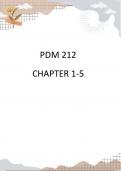PDM 212
CHAPTER 1-5
, CHAPTER 1
Development and its Complexities:
Definition of Development:
-Development is the pursuit of a better life for everyone.
- In an unequal world, it primarily involves meeting basic needs: sufficient food, safe living
conditions, affordable services, and dignity.
- The course of development varies based on material and cultural visions of societies.
Democratic Decision-Making:
- Development's methods and purposes should be subject to popular, democratic decision-
making.
- Disagreements exist on the feasibility and means of achieving a better life for all.
Contentious Nature of Development:
- Development is a contentious issue with diverse positions leading to intense debates.
- Its discourse can be used for various political purposes, sometimes conflicting with its
egalitarian ethic.
Development vs. Economic Growth:
- Development is distinct from economic growth, which often focuses on expanding the
economy without addressing inequality or poverty.
- Neoliberal growth has occurred alongside widening income inequality, questioning the
effectiveness of this approach.
Conditions of Development:
- Development is concerned with the conditions under which production occurs.
- It pays attention to environmental impact, labour relations, and the social consequences of
economic activity.
, Optimistic and Utopian Nature:
- Development is an optimistic and utopian concept aiming to change the world
for the better.
- It emphasizes starting at the bottom rather than the top for true societal improvement.
Two Dimensions of Emancipation:
- Development embodies human emancipation from nature through technology and self-
emancipation, allowing control over social relations and cultural proclivities.
Poststructuralist Critique:
- Poststructuralists challenge developmentalism, asserting that it defines all progress and
drains emotions, making people machine-like.
- Modernity, reason, and consumption are not automatically deemed "good" in their view.
Complex, Contradictory, and Contentious:
- Development is complex, contradictory, and contentious, reflecting both the best and worst
of human projects.
- It is subject to manipulation and can be used for purposes conflicting with its original intent.
Developmentalism as a Battleground:
- Developmentalism is a battleground with contention between various perspectives such as
bureaucratic economists, Marxist revolutionaries, environmental activists, feminist critics,
postmodern skeptics, and radical democrats.
- Shifts in emphasis, like the World Bank's focus changes, can have profound consequences
on vulnerable populations.
Need for Informed Critique:
- Critiquing development requires assessing fundamental pros and cons.
- Avoid assuming that the latest criticism is the final word; informed critique may lead to a
more valid conception of development.
, The Geography of Development
The Geography of Development
Social-Scientific Perspective on Development:
- Development is examined through various academic disciplines.
- Authors emphasize their perspective as human geographers, focusing on the geographic
aspects of arguments and theories.
Geography's Dual Focus: Nature and Space:
- Geography explores the interrelation between nature (societies and environments) and
space (regional variations, global tendencies).
- Regional variations in human characteristics are produced by different modes of socially
transforming nature.
Spatial Connections in Geography:
- Geography examines spatial connections, especially through trade and power relations
between societies.
- Different types and levels of development lead to interactions through various spatial
relations such as commodity chains, ideologies, ownership systems, and investments.
Global Totality and Geographic Approach:
- The global totality is understood by examining the regional and local parts through a
geographic approach.
- This method helps make sense of global complexity by analyzing its individual components.
Link Between Past Production and Current Human Existence:
- Human existence today is a result of past production.
- Modes of production vary spatially, influencing the character of social forces, relationships,
institutions, and thought processes.
Variability in Material Development and Living Standards:




